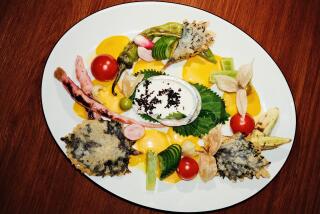How Louis Macouillard’s watercolors of Hawaii, California and the South Pacific inspired a life of travel
Grace Harrison fell in love with Louis Macouillard based on his artwork.
Nearly two decades later, so did I.
Harrison, an advertising copywriter in San Francisco, was mesmerized by the watercolors that her boyfriend, who was serving in the U.S. Navy during World War II, sent home to her in the States. They depicted exotic tropical lands and included South Pacific life in New Caledonia and the Solomon Islands.
The detail is astonishing — down to the wooden kola-kola bird pictured atop a home on Savo Island, part of the Solomons.
The watercolor courtship worked, according to a 1943 Life magazine cover story about the couple. She and Macouillard married in July of that year, and they remained together until his death in 1987. She died in 2000.
As a child, I fell under the spell cast by the menu covers Macouillard created for Matson Lines, and I spent the next half-century staring at images depicting an oft-exotic outdoors, first in my parents’ home, then in my mother’s, now in mine.
They were a sort of early social media, highly shareable (seemingly everyone had a set judging by the numbers available on eBay) and exceptionally visual.
Macouillard, a Bay Area native, became a commercial artist after the war and worked for various entities, including Matson. He was the last of the Matson “menu men” whose images fronted the passenger ships’ elaborate daily offerings. (Rainbow trout or pheasant, anyone?)
Matson works by Frank McIntosh, John Kelly and Eugene Savage preceded Macouillard’s and are better known. They’re more intricate, sophisticated, powerful.
All played a role in creating the dream that drew people to Hawaii when it was still a territory, but it was Macouillard’s works that won my affections almost from the moment the Matsonia liner sailed us to Hawaii in 1961.
By then Hawaii had become a state; a decade later, Matson would stop carrying passengers from San Francisco and Los Angeles to Honolulu and beyond. Jets delivered tourists in five hours instead of the five days it took the gleaming Matson ships.
At the Oakland offices of Matson, now just a shipping company, two original Macouillard menu covers were hanging in an office when I visited in August; four were stored in a closet. By contrast, the much more vibrant and valuable Savage works hang in the hallways.
The Savages are oils; Macouillards are watercolors, a form that is not always as prized but is more welcoming to beginners.
In 1961 I was a beginner, a newcomer inextricably drawn to Hawaii and later, like many Baby Boomers, to travel.
Macouillard’s magic remains part of that siren song that lures me to places I might not ordinarily go.
I can, for instance, catch a glimpse of a hybridized Macouillard on “Hawaii Five-O” (the reboot). If you look closely, you can spot it on an office wall when the detectives are working inside. It’s a blurring of Macouillard’s Hawaii hukilau — net fishing — work and the Tahiti print; Lynn Blocker Krantz, a Southern Californian and a Matson historian, blended the two pieces, which have had a cameo in the TV show for the last six years.
Or I can conjure up an image of a recent visit to the Bank of America in San Mateo, Calif., where a large, stunning mural designed by Macouillard and created in the early 1960s covers the front of the A.P. Giannini building. It tells the story of the BofA founder’s beginnings, of California and of the Giannini Foundation, which supports California agriculture.
Or I can look at those menu covers and wonder when I’ll get to Fiji or Samoa or New Zealand or when I can return to Australia — all by way of Hawaii. Naturally.
::
Romanticized, stereotyped beauty on the Matson cover menu
Idealized, stereotypical beauty. It’s what’s for dinner.
These covers of Matson menus, painted by Louis Macouillard, portray a romanticized version of the destinations the line served. The descriptions — “captions,” as it were — paint word pictures that are sometimes laughable and other times offensive.
A Fijian’s grandfather is “a fierce barbarian,” one blurb reads. “Samoans have been exposed to civilization,” that descriptor notes, but “many still cling to their thatched hut villages.”
People in general and Hawaiians in particular tend to be more forgiving of such artwork, especially when viewed through a modern prism, said DeSoto Brown, a historian at Honolulu’s Bishop Museum.
“Most Hawaiians saw them as really pretty pieces of art, for the most part,” Brown, a fourth-generation resident, said of the menus.
“Because this older artwork has this nostalgic air to it, a lot of people who would be really critical today will look at this older stuff with affection… and not take it seriously.”
Some tidbits included in the “about the covers”
Australia
“The only island continent, the first created and the last discovered, with much to stir your curiosity….. Friendly and fun-loving, Australians breed champions at golf and tennis.”
Fiji
“You see in Suva a modern seaport…but only a short drive away you discover jungle-hidden villages where Fijians still live in thatched huts and kava ceremonies and ritual dances take you back to a bygone age.”
Hawaii
“You mingle in the colorful seashore life centered at world-famous Waikiki hotels, watch an entire village make a gala festival out of a fishing excursion, the hukilau; hear wistful Hawaiian melodies and find yourself spellbound by the enchantment of Polynesia.”
New Zealand
“Nature has taken counterparts of the greatest scenic wonders of every continent and arranged them in beautiful patterns on two large islands….To a remarkable degree, New Zealand is truly a world in itself.”
Samoa
“Your ship…sails into lush loveliness of Pago Pago harbor….A stalwart fita-fita (native policeman) is happy to tell you where to shop for kava bowls and tapa mats…”
Tahiti
“Tahiti remains the unspoiled, exquisite Bali Hai of timeless South Sea lore… a dreamland to those who have never seen it and a haunting memory to all who have.”
San Francisco
“Standing on an eminence, you see over the jagged line of skyscrapers the magnificent sweep of San Francisco Bay, traversed by two world-famed bridges and dotted by watercraft of every kind. And you hold your breath, enthralled.”
Southern California
“You can drive from a snow-capped peak to a sunswept beach in a couple of hours. You can ride horseback down a rockbound canyon in the forenoon, roam entranced through Disneyland in the afternoon, and dine in a rendezvous of movie stars in the evening…. Wish for the travel thrill you want, and Southern California will quite likely produce it.”
More to Read
Sign up for The Wild
We’ll help you find the best places to hike, bike and run, as well as the perfect silent spots for meditation and yoga.
You may occasionally receive promotional content from the Los Angeles Times.







